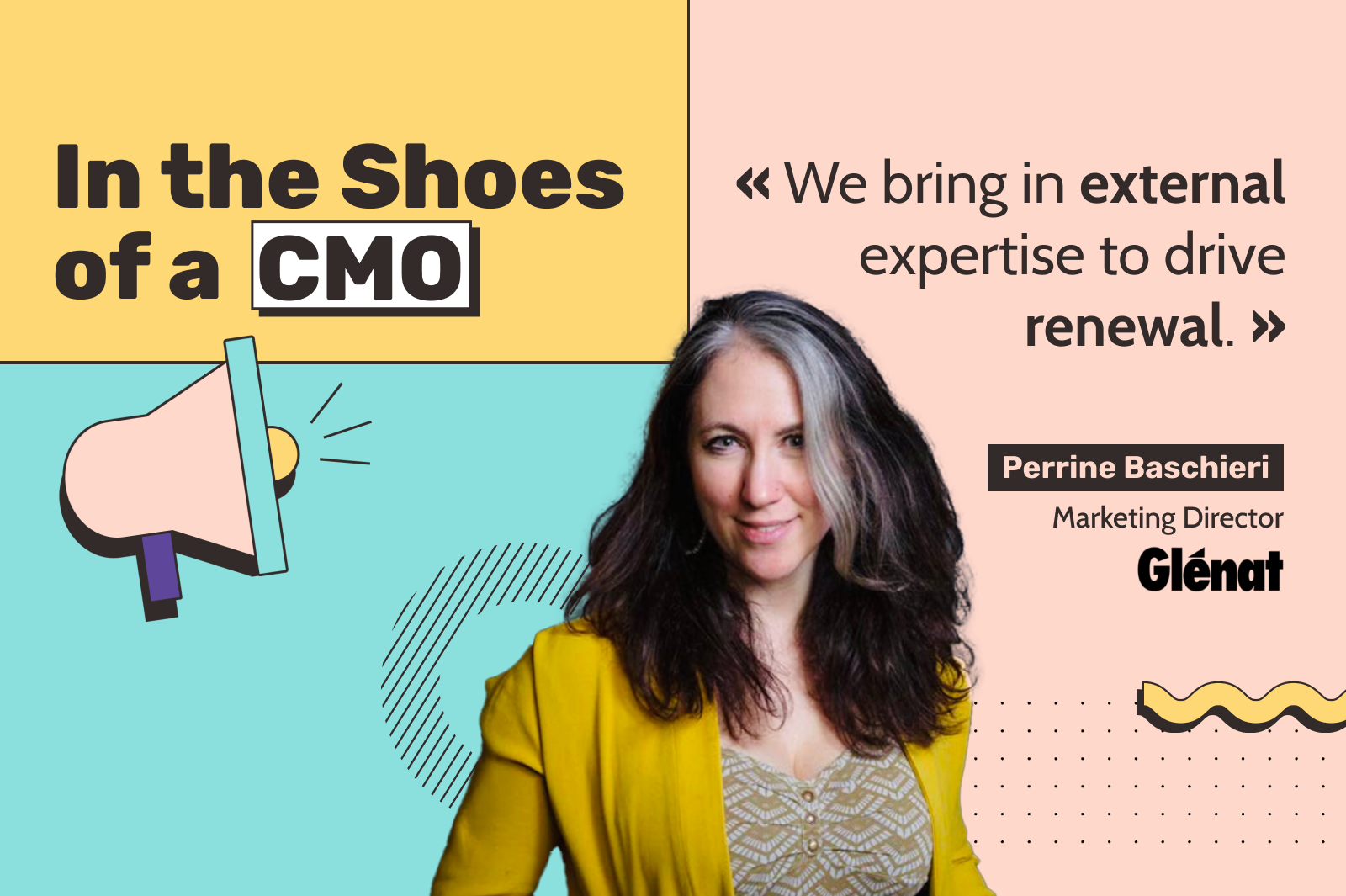
July 15, 2025

July 15, 2025
15/7/25
At Glénat Édition, Perrine Baschieri has been leading the entire marketing strategy since 2021, managing a team of about twenty people across three divisions : product marketing, digital, and events. In a historically stable industry that’s been disrupted by the post-lockdown surge in manga and children’s comics, she has overhauled the entire marketing chain : new formats, the rise of live content, influencer activation, CRM strategy, and a focus on reading platforms. In this interview, she shares her current priorities, her vision of editorial marketing, how she structures her teams, and what she expects from her partners.
Perrine Baschieri : The book industry is relatively stable. Growth usually fluctuates between -1% and +1% per year, with occasional spikes from publishing phenomena like Astérix, Harry Potter, or more recently, The Housekeeper (La femme de ménage).
But in 2021, we saw a real paradigm shift : lockdowns caused a boom in reading, especially in comics. One in four books purchased was a comic, and one in eight was a manga. This shift expanded our communication scope and our readership. There was a generational effect, teens stuck at home read and watched a lot of anime. Streaming platforms played a key role.
This changed our marketing practices and priorities. I restructured our teams into three departments : product marketing (across our four catalogs), digital, and events. Events are fundamental in our sector : they’re a direct conversion channel, but also a key lever for brand building and community engagement.
P.B.: When I arrived, digital marketing at Glénat was still underdeveloped. We hired more hybrid profiles, built an in-house studio, and even launched our own Twitch channel, something no other publisher had done at the time. Today, we host regular livestreams about comics and manga.
We’ve also expanded our influencer strategy. Since Japanese authors don’t make public appearances, we had to find other voices. We brought in fans and even gaming influencers like Ken Bogard and Ultia. Ultia, for example, didn’t read comics four years ago. Today, she hosts our livestreams at Angoulême. We successfully transitioned people from gaming to comics, which is quite rare.
We’re also testing TikTok, though the results aren’t as strong yet. BookTok, the subcommunity focused on books, works well for romance, especially through our subsidiary Hugo Publishing, but not as much for comics, manga, or children’s books.
As for AI, we’re still in the observation phase. I’m neither for nor against it. For now, we’re exploring use cases: improving SEO, fine-tuning copy, speeding up production. We want to take our time, do it right, and ensure we stay compliant with legal requirements.
P.B.: Events are a major strategic pillar. They’re the direct meeting point between our audience, our authors, and our brand. For the last Japan Expo, for example, we completely reinvented our booth by drawing inspiration from gamer events. The result : an immersive, digital booth with a studio upstairs, nonstop live coverage, exclusive trailer drops, giveaways, book signings… In just two days, more than 168,000 people followed our livestreams !
We adapted that model for Angoulême, a more traditional book fair. We incorporated video content, city tours with authors, and interactive formats. Events are a powerful lever for awareness, conversion, and differentiation.
P.B.: That’s a key challenge. We redesigned our website to better track user journeys. We now distinguish more clearly between customer profiles across our catalogs. But since we don’t sell directly, we lack transactional data—our readers buy from bookstores, large retailers, or online platforms.
To compensate, we conduct a lot of quantitative and qualitative research and organize field workshops. We also regularly engage with booksellers to get feedback on formats, pricing, customer expectations… These are like real-time focus groups.
P.B.: I’m looking for passionate people. People who read, know the authors, and understand the communities. In product marketing, I have segment-specific leads who are true experts. Some have been with us for years, others have more unconventional backgrounds.
In digital, I’ve hired agile, often self-taught profiles. Some already had personal projects, podcasts, videos… They’re not always formally trained in digital marketing, but they have a strong interest in writing, content creation, or editing.
Events are another world, very intense. You have to manage five-day fairs from 7 a.m. to 2 a.m., stay cheerful, and handle the unexpected. I look for highly organized, outgoing people who enjoy fieldwork. Beyond skills, I place a strong focus on team cohesion.
P.B.: We use several formats. When a need is shared across the team, we organize group training internally with support from management and HR.
We also fund external training directly from our own budget when needs are more specific. Recently, the digital team expressed interest in AI training to boost their day-to-day efficiency. That request is currently being evaluated across the department.
Beyond formal programs, we value hands-on learning. Several team members have taught themselves video or podcasting and have become internal experts. This ability to self-learn is one of the strengths of our team.
P.B.: External partners bring in skills we lack or provide much-needed perspective. For big projects like La Nuit One Piece (an event tied to a new One Piece release), which we’ve run for four years now, we bring in an agency. It’s a massive undertaking : 600 retail locations activated, live streaming, nationwide coordination… We need support ! But the vision always remains internal.
Today, we also rely on external partners to help us stay fresh and get new ideas. We can’t be constantly innovative without breathing room. We need outside inspiration. We also work with our distributor, Hachette Digital, who provides tools like Kolsquare for influencer marketing. Some tools fit our needs, others don’t, but they’re always a valuable source of ideas.
L’équipe Spaag.